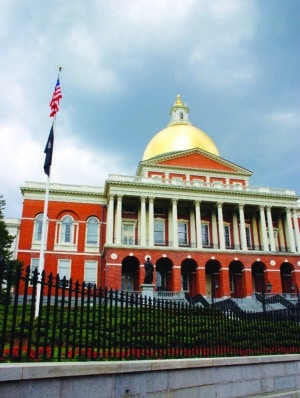A coalition representing a wide swath of the state’s real estate industry is calling out a proposed “net-zero” building code included in a package of legislation the state legislature is considering as part of a plan to shrink Massachusetts’ carbon footprint to zero by 2050.
The bills, proposed by Senate Majority Leader Karen Spilka, passed the senate Thursday night.
NAIOP Massachusetts, the Home Builders & Remodelers Association of Massachusetts, the Associated General Contractors of Massachusetts and the Massachusetts Association of Realtors issued a statement this afternoon applauding the Senate’s effort to tackle the causes of climate change, but said a proposed, opt-in, low-carbon building code would create additional costs for real estate development.
“We certainly view climate change as a critical issue. It’s an economic development, public health and environmental issue that affects every resident in the commonwealth,” NAIOP CEO Tamara Small told Banker & Tradesman. “These need to be addressed whether it’s through mitigation or adaptation and resiliency. But we need to make sure we have policies that are implemented in a way that are technologically or economically feasible.”
S.2477 includes a proposal that would let cities and towns opt into a “stretch” energy code to be developed by the state Department of Energy Resources.
Currently, buyers of net-zero designs for new single-family houses and larger buildings have to pay a premium for that energy efficiency, Small said, and there are few, if any, tall buildings built to this standard which would give the construction industry confidence it could be done affordably. Lab space, an energy-intensive but key part of the region’s economy, likewise has few net-zero precedents.
“Net zero by 2050 is a goal we can support, but communities being able to adopt a net zero code tomorrow, that’s something we have a problem with,” she said. “There’s a cost impact to this, when you have a housing crisis. […] What does this mean for the production of housing? What does this mean for the price of housing?”
The real estate coalition also said the move would lead to the creation of a patchwork of building codes from town to town, making it difficult for developers to figure out how they should design their buildings. The coalition also raised the specter that some towns could use the net-zero code as a way to block development.
During introductory debate of S.2477 on the Senate floor Thursday, the Democratic majority shut down an effort by Minority Leader Bruce Tarr to send the bill back to the Senate Ways and Means Committee for redrafting and a public hearing.
“What is this going to cost?” Tarr asked after the motion was rejected. “What is it going to cost the consumer? Because we know that many household budgets are already strained, are already constrained by limited resources.”
Tarr stressed the importance of addressing the “bipartisan issue” of climate change. He argued, though, that the 123 amendments filed indicate the bill is missing several important components such as mandating cost estimates from market-based emissions reduction mechanisms and sufficient protections for low- and moderate-income families that may be affected if and when the executive branch delivers on the bill’s carbon pricing requirements.
Ways and Means Committee Chair Michael Rodrigues responded that the committee built the legislation based on several other bills that had already been heard and advanced by the Joint Committee on Telecommunications, Utilities and Energy.
The Senate voted 33-4 along party lines to reject Tarr’s proposal, with other senators saying amendments on the floor of the Senate would suffice.
Chris Lisinski and Colin A. Young of the State House News Service contributed reporting.




 |
| 


